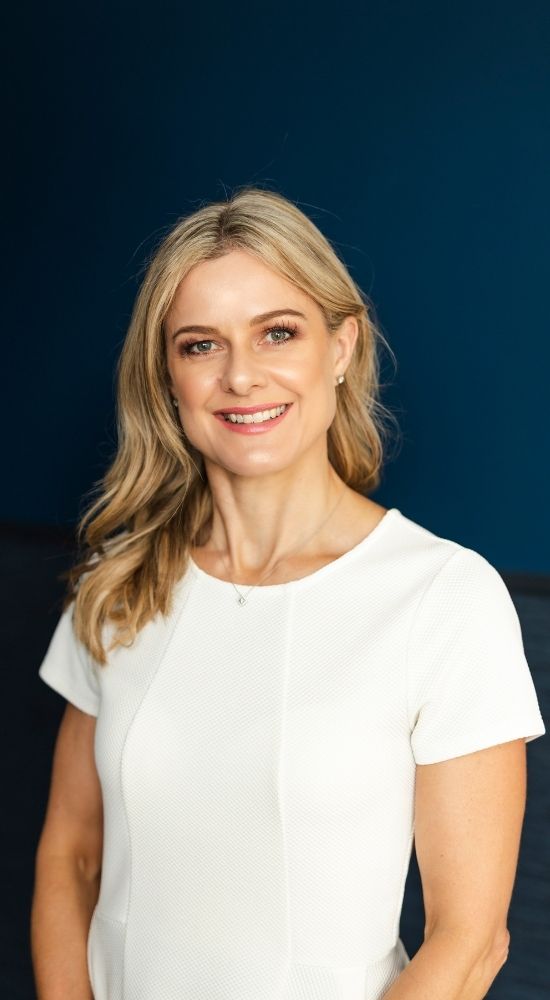The owner of Skin by Sarah Hudson notes significant business benefits from personalised training and mentorship.
Salon and clinic owners are all too familiar with what is commonly referred to as the industry’s ‘staffing crisis’. Despite projections suggesting the Australian beauty industry will grow strongly by over 12 per cent until 2026, experienced staff are often displaced early in their career and exit the industry altogether.
Challenging this conundrum is Sydney-based clinic owner, Sarah Hudson who last year rolled out her business’ first mentorship program. Behind the move, Sarah sought to secure an extra set of hands for a minimum three-year period. “I wanted a therapist with under two years experience because they’re the ones who struggle to find career fulfilling roles with clearly defined stages of progression and advancement. Sarah tells Professional Beauty. “There’s not a lack of people training in the industry, there’s a lack of therapists staying within the industry.”

The mentorship program
Sarah hired Elizabeth* – a qualified beauty therapist who was suitably trained in providing high volume massage and spa-centric treatments in a franchise salon environment. While Sarah recognises that franchise operated salons make for a “good area for therapists to start”, she cites a downside being that therapists are “working on the same treatments all the time.” Sarah was also privy to Elizabeth’s passion for the skin and identified her goals to learn more about the skin and advance her knowledge in aesthetic treatments and protocols.
Sarah has designed the mentorship program much like an apprenticeship. She says she was willing to put in the work to provide training, mentorship and support, with agreement that Elizabeth would stay employed with Sarah’s business. “We do say in [her contract] that she has to stay for a minimum period of three years unless we both mutually agree that if, for example, the program was not delivering to the expectation of both sides that we would terminate the agreement,” Sarah explains.
At the time of interview, Elizabeth was four-and-a-half months into Sarah’s mentorship program, and is paid the same rate as a fully qualified beauty therapist. She isn’t, however, entitled to earn a weekly commission. “That’s where she had to take a step back, as she would have been earning weekly commissions in another business,” Sarah admits. “Once she’s doing more treatments, I will start introducing a weekly-based commission.” As a hired, full time beauty therapist, Sarah needn’t have considered any outlying legalities or regulations around taking a fully qualified therapist like Elizabeth on and paying less than award wages.
Investing in education
Sarah provides all in-house training on areas such as the way treatments are performed, the way her team communicate with the clients, and mastering the overall client experience. “I have purchased training with The Skin Queen and will also buy Gay Wardle’s skin education in the future, once Elizabeth’s skillset is further developed.” Elizabeth will also take part in any supplier education as she progresses through the various stages of the mentorship program. Elizabeth’s commitment to the program is to revise much of the course work she completed during her initial studies and must be completed outside of working hours. At staff meetings, Elizabeth is required to provide a recap of what she’s learned for the week, including “some of the basic fundamental skin knowledge that even I have forgotten!” Sarah adds.
“What makes the program different is that we did not allow her to touch a client for four months,” Sarah says. Instead, Elizabeth has shadowed Sarah and another colleague to observe and master the Skin by Sarah Hudson experience. These service basics include: “This is how we want a client taken into the room; this is how we want the client spoken to; this is how we want you to present our client with a glass of water,” Sarah explains. Reception and front desk training was also provided “because we could shape the way she was talking to clients and would observe how we would prescribe and explain our skin programs and retail sales.” Sarah believes this time spent training allowed Elizabeth the opportunity to build client relationships in her own right.
Building a rapport with clients
Step-by-step, Elizabeth has progressed from initiating client conversations, to welcoming clients into the treatment room, and commencing a basic cleanse, now progressing to a signature cleanse to Skin by Sarah Hudson. “She had to explain to clients the technical reasons of the cleansing process and how the cleanses related to the various skin types. That really helped build her confidence and quickly transition to other areas of client services,” Sarah says. “Building a rapport with the client is key. If one of the team was away sick, or a team member left, and as I reduce my hands-on treatment hours to work on the Sarah Hudson Skin product line, clients are happy to know that [Elizabeth has] fitted in well. When you have a senior member of staff, [a client] doesn’t want to see a junior member, but now they feel more confident [knowing] that I would always be in the background overseeing the treatment and client experience.”
Facing challenges
At each stage, Elizabeth’s work is assessed and feedback provided to her. “The first three months were not easy for her. I recognised it was very important that I encourage her because you’re constantly critiquing her whilst building skills at the same time.” Providing training of this nature also comes with financial risk to Sarah who forgoes this source of income of a junior therapist in the initial stages of the mentorship program. Sarah sees the challenges that many junior therapists face who are are then “basically self-taught”. “No one is observing them or teaching them, so their education is coming from themselves.” Sarah knew her business would take a hit on Elizabeth’s wage before recuperating any money. “That’s a really big thing for a small business. It was [a deficit] of about $15,000 [over the four-and-a-half months].”
Sarah knew her business would take a hit on Elizabeth’s wage before recuperating any money. “That’s a really big thing for a small business. It was [a deficit] of about $15,000 [over the four-and-a-half months].”
Problem solving
Despite not having offered a classic facial in her business for ten years, Sarah opted to re-introduce a tailored facial specific to Elizabeth. “We incorporated different types of therapies and techniques that I had learned over my career and customised my own signature treatments. I also invested in the Dermalux Flex MD to incorporate the technology into a classic facial. I knew as a business owner that if I let her go into [the treatment room] and do her own facial, she’s not learned anything. So we had to then create different techniques for her that would keep her active and energised.”
Sarah has also introduced some base level services into the business that allow flexibility to incorporate into lower priced promotional services designed to build Elizabeth’s confidence; services like microdermabrasion, peels and LED. “This generates extra income into the business [without] taking away from our high end services,” Sarah says. “This then allows us to target a different, younger demographic that we don’t currently target.” Sarah is also working with Vanessa McDonald from Salon Marketing Creative Agency. The mentorship program in Elizabeth’s second year will include aesthetic device education and training specific to her skills and qualifications. “I would then get an additional commitment from her as well… because that’s a whole other expense again.”
The verdict?
So is the program paying off? Sarah says “yes”. “Launching with a very bespoke signature facial is where we’re recouping our investment; everyone is confident to go and see her… the feedback is fantastic.” And while Sarah admits Elizabeth is yet to learn how to perform a full consultation, the small amount of consulting she does provide is “enough” for the facial treatment she performs, largely due to Elizabeth’s new-found confidence. Sarah plans to train Elizabeth in detailed consultations in early 2024, offering clients a free consultation with her as a starting point.
For Elizabeth, having the opportunity to be trained to effectively work with the skin by providing advanced treatments is really important. She shared that by taking the time to shadow her colleagues, Elizabeth could “relax into the business” rather than feel the “pressure of being thrown into the treatment room”. Instead of running through a generic script with each client, she was pleased to have the opportunity to learn through observation. Sarah added, “a lot of therapists are very visual and often quite creative, so handing them reams of paper doesn’t always work.” Elizabeth expressed her pleasure in being taught how to do things, as opposed to being taught to simply do them. She also admits to gaining confidence through acceptance as part of the broader team, as opposed to simply serving as an additional junior therapist.
For Sarah, the benefits of implementing a mentorship program have outweighed the risks. “I honestly think it’s one of the best things I’ve ever done in the business,” she admits. “It’s not about bringing in a junior member of staff. This is about being a mentor to a younger therapist; for you to give confidence to, to work with, to build up their education and skills. But in return you expect them to put in the hard work as well. As a business, it’s building more income, it’s building more diversity within services, and it’s allowing us to have a different target market. It’s a lot of work as a business owner because every aspect of a treatment and Skin By Sarah Hudson experience has to be assessed. I find sometimes the workload overwhelming, but now that I’ve started I will have a structure that I can keep implementing and adapting as we undertake new mentees in the future. If I had a bigger facility, I would do this every 12 to 18 months because that way you’ve always got someone trained up when someone drops off.”
“As a business, it’s building more income, it’s building more diversity within services, and it’s allowing us to have a different target market.”
The future of industry mentorship
Sarah sees that one of the best features of running her mentorship program is her ability to give back to the industry, and hopes more business owners consider doing the same. She’s eager to see that inbound beauty therapists undergo an internship program via their training providers before graduating. “I know a lot of businesses wouldn’t be able to afford to do [a mentorship program such as this]. Yet if [therapists] were coming into the program on a lesser wage, then this would motivate other business owners to adopt similar programs. This would allow the industry to have an injection of newly skilled and confident, relevant and specifically supervised post qualification program for junior therapists.”
“As an industry leader, let’s encourage these younger therapists who want to work within the skin industry. [Let’s] listen to what they say and set up these programs so they’re not left to their own devices in the treatment room; programs where we’re putting time, energy and education back into them and actually reaping rewards through confident well-educated therapists who are committed to the business. I think that’s really important. One thing I’ve learned most is how to be a better leader and mentor,” Sarah admits. “I’ve had to learn to be softer and more encouraging. Remember – we’re dealing with 20 and 21 year-olds here.”
*Surname withheld
Read the current issue of our digital magazine here:
- For more news and updates, subscribe to our weekly newsletter
- Follow us on Instagram
- Like us on Facebook
- Join Australia’s largest network of beauty industry professionals on LinkedIn
- Subscribe to our print magazine
Have an idea for a story or want to see a topic covered on our site and in our pages? Get in touch at info@professionalbeauty.com.au.

